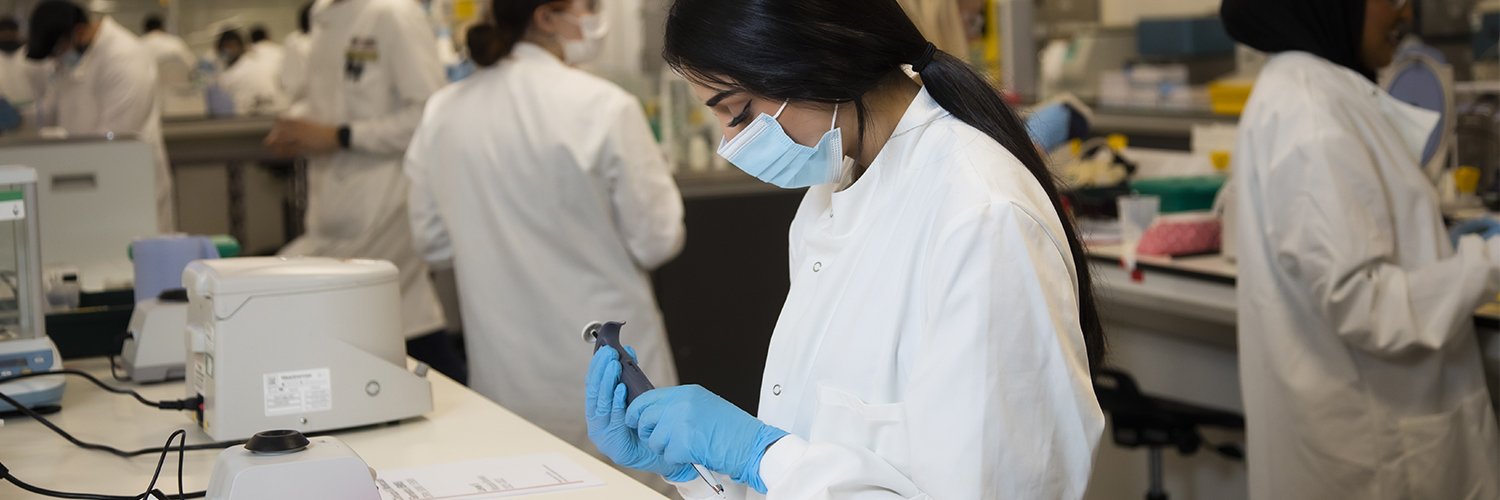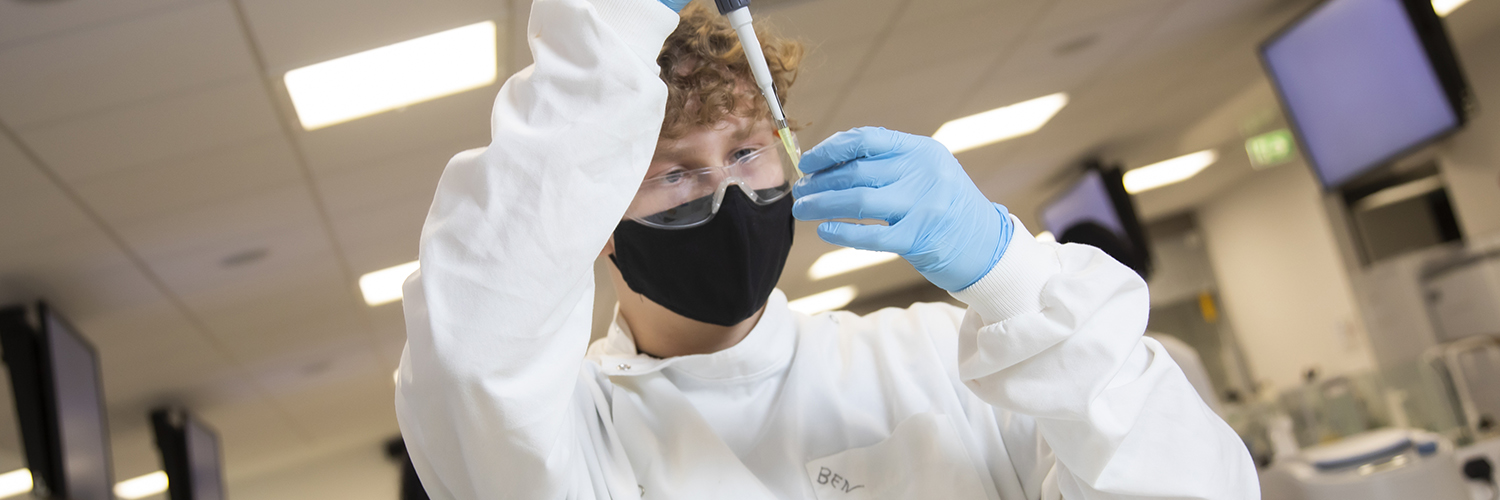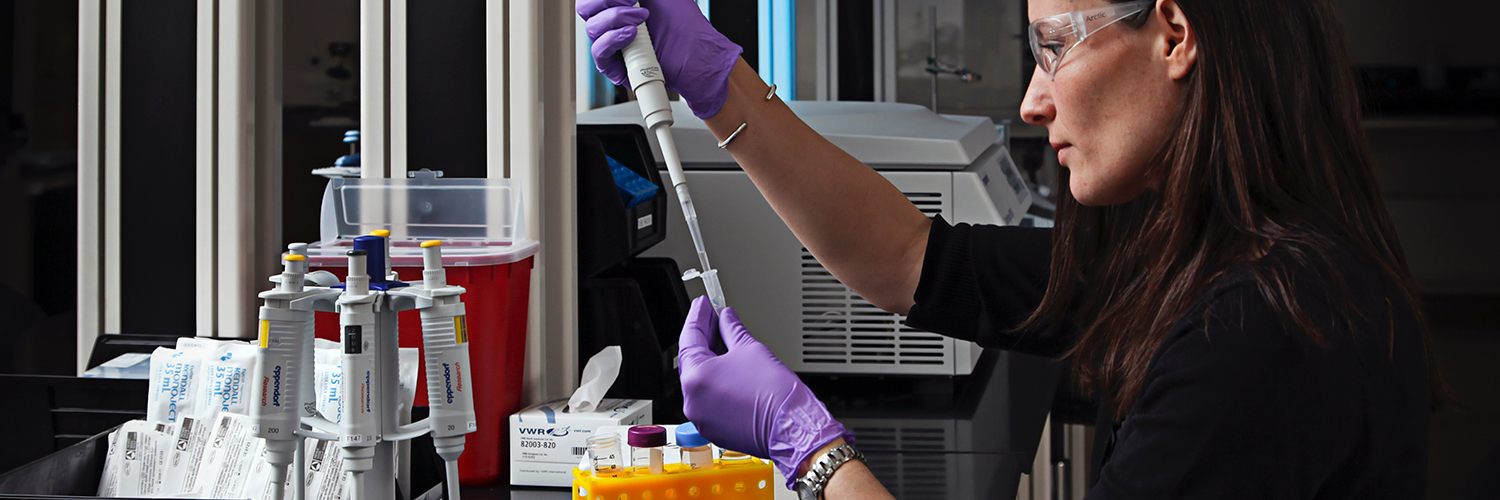
Human Biology and Infectious Diseases
Full-time
Part-time
With placement
Three year
Six year
Four year
September 2026
In a nutshell
One of the few courses of its kind outside of medicine to combine aspects of human physiology, immunology and infectious diseases, our Human Biology and Infectious Diseases degree explores the pathology, transmission and epidemiology of infectious diseases affecting humans and animals.
Developed around a core human biology curriculum, you will build a systematic understanding of human biology and infectious diseases. You will explore specialist modules such as Pathophysiology and Veterinary and Zoonotic Infectious Diseases - all delivered within the supportive learning environment of our world-class Bodmer laboratories.
With a focus on your future, we place a strong practical focus on nurturing your scientific and transferable skills. Our human biology curriculum is carefully designed to incorporate individual and group projects and activities where you can build an excellent skill set that can prepare you for a career in medical laboratory research. Accredited by the Royal Society of Biology, the course delivers a solid academic foundation in biological knowledge alongside key laboratory skills that meet the needs of employers.
Start your study journey
Register for our next Open Day to learn more about studying human biology and infectious diseases, explore our facilities and meet the course team
You will:
- Gain a detailed and systematic understanding of human biology and infectious diseases
- Have the opportunity to gain an understanding of many non-infectious diseases such as cancer and heart disease
- Have the option to undertake a relevant industry placement in a clinical or research-based setting
- Have the opportunity to tailor your degree to your own ambitions through specialist optional modules
options available
students accepted
Course accreditations

This is for you if...
You are motivated to specialise in the areas of public health, tropical disease and infection biology
You wish to pursue a career that is aligned to solving real-world, global health issues
You are interested in a career in disease-based research or are interested in post-graduate entry medicine / dentistry
All about the course
Course delivery
Now is an exciting time to study human biology and infectious diseases. For three years of study (or four if you choose to include a placement) you will explore fascinating and relevant subjects, including parasitology, pathophysiology and molecular genetics. You will gain insight into disease diagnosis and treatment all while refining your practical laboratory and human biology research skills.
Learn more about the modules you will study in the section below.
Learning experience
This human biology course has a hands-on focus, enabling you to develop the practical skills you need for a career in laboratory research in a wide range of industry sectors. You will be taught by expert academics and technicians, who undertake cutting-edge research in our Biomedical Research Centre.
In your final year you will specialise your skills by choosing optional modules in areas such as antimicrobial resistance, pathophysiology, clinical immunology and veterinary and zoonotic infectious diseases. You will also develop your research design, problem solving and critical analysis skills by completing a final year project on a topic of your choice.
Read about Alia's experience studying Human Biology and Infectious Diseases.
Industry placements
On this human biology course, you will have the option to take an industry placement year between years two and three. Although you will be responsible for securing your placement, a tutor will support you, monitor your progress and assess your final placement report. In our experience, placement students achieve better final degree results and employment prospects.
Building on our industry-focused approach, we have developed longstanding connections with regional health and scientific research organisations. Recent Human Biology and Infectious Diseases students have completed placements at the Wolfson Imaging Centre in Manchester, the Clinical Epidemiology unit at Manchester and at TSC Ltd in Heywood.
Molecules to Microbes
This module focuses on the basic principles involved in the build-up of molecules from atoms: the formation, properties and importance of bio-organic molecules, the diverse nature of micro-organisms and their structure, function and importance.
Genetics
Genetics has become a central topic not only in biological science, but also for topics such as data science, art and culture. Genetics is revolutionising all spheres of life at an unprecedented speed. It is central to all areas of biology, from cellular development and reproduction to conservation and biodiversity. In this core module, we will provide you with the framework of this diverse area, covering areas from DNA fingerprinting and DNA/RNA editing, to ethics and conservation biology. We will expose you to the latest research in the area of molecular genetics and provide the foundation for your future.
Human Anatomy
The module aims to introduce aspects of Human Anatomy/Embryology and enable the appreciation of structure-function relationships at the level of the cell, tissue, organ, system and organism. The lectures in the first trimester will introduce Gross Anatomy and Embryology using a system-based approach and the second trimester will detail the Histology at cellular and tissue level. The collective systems led approach will provide a good understanding of the macroscopic and microscopic structure-function aspects of the human body.
Biological Skills
This module will help you develop practical laboratory skills employed in biological laboratory practice and relevant to cell, organismal, micro and molecular biology, which will form a basis for competence in biological and biochemical experimental work.
Study Skills
In this module you will learn by observation, investigation, comparison and engagement and will develop practical learning and presentation methods which can be applied generically during year one and beyond. You will also gain an appreciation of Personal Development Planning and effective data handling, calculation and numerical skills.
Cell biology
This module provides a broad knowledge base in cell biology that acts as a foundation for content covered in other areas of the programme. The syllabus primarily focuses on mammalian cell biology and includes key content on the structure, function, cell cycle and techniques used in visualising healthy and diseased cells. The content also focuses on cellular processes and mechanism that occur during growth and death, you will learn about cell signalling and finally the metabolic processes that occur at a cellular level that are essential for life.
Molecular Genetics
Molecular Genetics will enable students to gain practical skills in molecular biology and bioinformatics, through linked laboratory and computer sessions. The lecture programme is delivered by three academics, each an expert in their specific area of molecular genetics. Topics covered include, current molecular biology and bioinformatics techniques, the control of bacterial and eukaryotic gene expression, the effect of mutations on gene expression, population genetics and the application of molecular genetics to conservation.
Introduction to Parasitology and Infectious Diseases
This module aims to provide you with a comprehensive lecture programme and directed reading, enabling you to gain knowledge and understanding of: the range of infectious diseases that impact on humans; the basic biology and life cycles of protozoa and helminths of medical importance; vectors that transmit infectious agents and the internal and external factors that affect transmission of infectious diseases.
Biological Research Skills
This module is designed to help you develop an ability to understand the basics of scientific research in the following areas in order to prepare you for future research based activity:
- critical evaluation of research-based literature
- understanding experimental techniques and design
- data interpretation, analysis and presentation
- dissertation writing and presentation
Microbial Communities and Interactions
This module will help you to build your knowledge and understanding of fundamental concepts in microbiology. You will learn about the phenomenal diversity of microbial metabolism and genetics and how microorganisms have adapted in communities to survive and thrive in the most extraordinary habitats. You will investigate key examples of microbial interactions with their hosts and with each-other and how this can lead to disease or beneficial relationships. Our field trip provides a first-hand experience of how microorganisms are applied to benefit human populations. You will also refine your skills in practical microbiology, experimental design, data presentation and critical awareness of scientific research.
Pathophysiology
In this module you will learn the inter-related nature of human disease and major diagnostic approaches. Assessment is via a series of case studies to develop awareness of disease processes on a cellular level and their manifestation into localised and systemic clinical symptoms. Students gain insight into clinical diagnostic techniques and their underpinning principles.
Human Physiology
Investigate the function of major organ systems and how they regulate homeostasis. Using cutting-edge lab equipment, you will develop practical skills to analyse physiological adaptations as true physiologists do in the world sport and exercise science.
Human Genetics
The role of genetics and genomics has now become mainstream and is at the forefront of healthcare and disease management strategies. In your final year, the human genetics module will expose you to the recent developments in the field, together with the foundations of human genetics. The rapid advancement of genomics has also enabled data-based discovery of genetic information. In view of that, you will have a dedicated part of the content focused on data science and analysis strategies including the R statistical package.
Biology of Parasites
This module looks at the importance of human and animal parasites, in relation to medical, veterinary or wildlife aspects, life-cycle biology, host response and the principles of parasite epidemiology and transmission. You will also study strategies for parasite detection, diagnosis and control. The module includes a unique field course to enable you to see parasites living in their natural environment.
Choose one of the following optional modules:
Advances In Pathophysiology
This highly interactive optional final year module allows students to explore methods used in the diagnosis, monitoring and treatment of cardiovascular and respiratory (thoracic) diseases. Assessment of the module uses real case studies to enable students to develop both their analytical and critical narrative skills. Students will learn mechanisms of disease, how these relate to clinical outcomes, how patient care plans are developed, and the future approaches of thoracic medicine. Special features of the module include full CPET testing in the Health School human performance lab and the opportunity to visit to the North West Lung Centre to engage with clinical pulmonary testing.
Clinical Immunology
Immunology is the study of the immune system. It is now a well-developed basic science, which is useful for the diagnosis and management of a great number and variety of human diseases. This module is designed to give an in-depth view of the basic components of the immune system and how these influence human diseases. Research-based discussion will be part of this module in understanding immune mechanisms in defense against human diseases and how these mechanisms can be dysregulated. Understanding the immune system leads to better clinical diagnostic and monitoring possibilities. Towards the end of the module you will also be given an overview of how the immune system can protect the body from developing cancers.
Plus one of the following:
Antimicrobial Resistance: Threats and Solutions
Antimicrobial resistance (AMR) is now widely recognised as one of the greatest threats to global health. This module focuses on the reasons underlying the emergence of AMR and investigates diverse often innovative solutions to the crisis.
Veterinary and Zoonotic Infectious Diseases
This module looks at the maintenance and transmission of infectious diseases of veterinary or zoonotic interest. Particular interest is focused on the role of wildlife species in the ecology and epidemiology of infectious diseases. The role of arthropod-vectors in transmitting infections, and how this influences the ecology of such infections, is also studied.
Choose one of the following final year project options:
Final Year Project and Professional Skills
This dissertation module allows you to develop independent research skills, including both data collection/generation (for example, via lab-based research or fieldwork) and analysis, while conducting research on a topic in an area relevant to your programme of study. You will also develop your professional skills, with a focus on employability.
Final Year Project with Science Communication and Professional Skills (HANS)
This dissertation module allows you to develop independent research skills, including data analysis, while conducting research on a topic in an area relevant to your programme of study. You will learn about science communication and the variety of methods in which science can be disseminated and communicated, and then put these methods into practice. You will also develop your professional skills, with a focus on employability.
We take a flexible approach to our course delivery that promotes diversity and inclusivity and provides a blended learning experience, which will vary to meet specific programme requirements. This learning time includes formal lectures and interactive activities such as seminars, tutorials, practical sessions, laboratory and studio learning. Smaller classes may be used to support collaborative activities such as project and group work and presentations. A range of different assessments and feedback is offered to meet the needs of both our diverse student body and specific subject needs.
Our undergraduate courses are normally made up of 20 credit modules which are equal to 200 hours of learning time. A three-year degree qualification typically comprises a total of 360 credits (120 credits per year).
Please note that exact modules and content offered may vary in order to keep content current and, for courses that offer optional modules, may depend on the number of students selecting particular options. When accepting your offer of a place to study on a programme with optional modules, you should be aware that optional modules may not all run each year. Your tutor will be able to advise you as to the available options on or before the start of the programme. Whilst the University tries to ensure that you can undertake your preferred options, it cannot guarantee this.
Frequently asked questions
What is human biology?
Human biology is an area of academic study that looks at humans through the influences and interplay of many diverse fields.
What does infectious diseases mean?
Our programme studies infectious diseases, meaning disorders caused by organisms in the body such as bacteria, viruses, parasites, or fungi. Many organisms live harmlessly in the body; however, some can cause disease under certain conditions. Examples of infectious diseases include hepatitis, influenza, coronavirus, and measles.
Why is it important to study human diseases?
Through the study of infectious diseases, we learn about the stages of the disease's development, including how it begins, how it progresses, how it is transmitted, and what kinds of medications or other therapies are effective in combating it.
Why is it important to study human biology?
In short, the study focuses on how we got here, how we function, and the role we play in the natural world. This helps us to better understand human health, because we can learn how to stay healthy and how diseases and injuries can be treated.
Is human biology and infectious diseases hard?
As a scientific field, this human biology and infectious diseases degree could be considered challenging, however, our human biology students find our programmes incredibly rewarding when gaining a wide range of skills during their studies.
There are methods to ensure you’re getting the best of your human biology and infectious diseases degree, including practicing good time management and making time for yourself to recharge. If you find your studies overwhelming, there will be support available from your lecturers and university support staff.
What job can I get with a Human Biology and Infectious Diseases degree?
Our alumni often go into the following roles after graduating with a degree in Human Biology and Infectious Diseases:
- NHS Clinical Scientist
- Physicians Associate
- Pharmaceutical development
- Food and beverage analyst
- Scientific writing
- Governmental advisor
- PhD studentships in health and disease
School of Science, Engineering and Environment
Rising to the challenge of a changing world, our degree courses are designed to shape the next generation of urbanists, scientists, engineers, consultants and leaders.
Driven by industry, and delivered by supportive programme teams, you can develop the knowledge and skills to become unstoppable in your career.
Facilities
As a biomedicine student, you will be based in our advanced, integrated teaching laboratory known as the Bodmer Lab. This specialist, purpose built facility ensures that you benefit from the latest technologies to keep teaching and learning apace with cutting-edge innovation and discovery.
Industry collaboration and research
When you start this human biology and infectious diseases degree with Salford, you are also joining a community making a difference in industry, our local region and in our wider society.
Many of our academics and technicians who support your course also deliver collaborative, interdisciplinary, high-impact work in a range of bioscience issues and challenges.
Discover how you are part of something bigger.
After your human biology and infectious diseases degree
Employment
We've designed the human biology and infectious diseases course to build your human biology knowledge and also help you to develop excellent laboratory skills. By integrating contemporary research methods and procedures into your studies, we also help you to develop a range of transferable skills that can boost your employability.
With growing interest in infectious diseases fuelled by the COVID-19 pandemic, new research and work opportunities will arise worldwide. RSB course accreditation provides a guarantee of quality sought by employers and enhances graduate employability. The course also aligns with postgraduate entry to medicine, dentistry and physician studies.
This human biology and infectious diseases degree is ideal for careers in pharmaceutical, biotechnology, public health, health care, scientific innovation, food manufacturing, teaching, and scientific communication. Today, you will find our graduates working with leading organisations such as Cancer Research UK and AstraZeneca, both in the UK and overseas.
Further study
You might find you want to learn more about biosciences. Building on our scientific expertise, we offer a range of postgraduate courses that can take your interests and career opportunities further. Salford graduates and alumni also qualify to receive a generous fees discount.
Human Biology and Infectious Diseases graduates can also choose to follow a research programme with our Biomedical Research Centre to further their knowledge in topics such as microbiology, parasitology, medicinal chemistry, cancer and cell biology. Learn more about postgraduate research opportunities available through our Doctoral School.
How to get accepted on the human biology course
Applicant profile
We're looking for applicants with a passion for science and discovery. Ideally, you will have a biology background and be motivated to specialise in the areas of human biology, public health, tropical disease and infection biology.
English language requirements
If you are an international student and not from a majority English speaking country, you will need IELTS 6.0 with no element below 5.5. We also accept a range of other English language qualifications.
If you do not have the English language requirements, you could take the Pre-Sessional English course, or the International Foundation Year to gain entry onto this degree.
Accreditation
This course is accredited by the Royal Society of Biology, which means that it meets their requirements for receiving up-to-date knowledge in the right learning, support and teaching environment. Studying an accredited course is one way of showing employers you have the knowledge and skills that they are looking for in graduates and has the potential benefits of greater employability prospects and enhanced competitiveness in a crowded global jobs market.
GCSE
English language and mathematics at grade C or 4 or above. Equivalents are accepted.
UCAS tariff points
104 - 112 UCAS points
A level
Two full A-levels required as a minimum, including Grade C in Biology
BTEC National Diploma
Grade MMM-DMM required from Applied Science or other Science-based BTEC including Biology modules. We can accept BTEC Subsidiary Diplomas in combination, where we would ask for a Merit grade in Applied Science.
T Level
Overall M required in one of the following T Level subjects:
- Health
- Healthcare Science
- Science
Scottish Highers
Two Scottish Higher Levels required, including Biology.
Irish Leaving Certificate
Two Higher Levels required, including Biology.
International Baccalaureate
30 points overall, including Grade 4 in Higher Level Biology. Must have passed the full International Baccalaureate to be considered.
Access to HE
104-112 UCAS points from a QAA Approved Level 3 Access to HE Diploma in a suitable Science subject and must include Biology content.
International Students
We accept qualifications from all around the world. Find your country to see a full list of entry requirements. If you do not meet the entry requirements, you could take the International Foundation Year to gain entry onto this degree.
Salford Alternative Entry Scheme (SAES)
We welcome applications from students who may not meet the stated entry criteria but who can demonstrate their ability to pursue the course successfully. Once we have received your application, we will assess it and recommend it for SAES if you are an eligible candidate.
There are two different routes through the Salford Alternative Entry Scheme and applicants will be directed to the one appropriate for their course. Assessment will either be through a review of prior learning or through a formal test.
The cost of studying human biology
| Type of study | Year | Fees |
|---|---|---|
| Full-time home | 2026/27 | £9,790 per year |
| Full-time international | 2026/27 | £18,120 per year |
Tuition fees will increase in the second and each subsequent year of your course by the rate of inflation, subject to the maximum fee limits set out by the UK Government.
Additional costs
You should also consider further costs, which may include books, stationery, printing, binding and general subsistence on trips and visits.
Scholarships for International Students
If you are a high-achieving international student, you may be eligible for one of our scholarships for human biology and infectious diseases. Explore our international scholarships.
All set? Let's apply!
Enrolment dates
Student information
Terms and conditionsUCAS information
Course ID BC15
Institution S03



